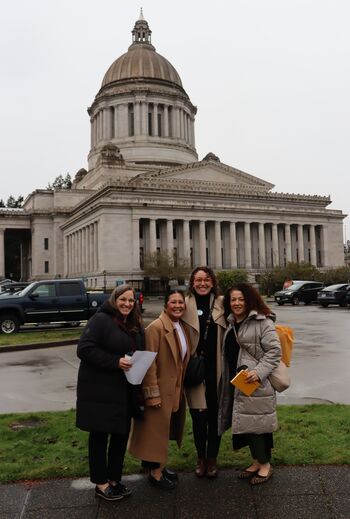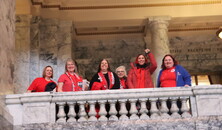Speak up for COLAs & Special Education

Coming up this week – take action now!
Wednesday was cutoff for passing bills out of their chamber of origin, so this week the bills that made it through are having committee hearings in their second chamber. Lots of hearings!
- We’ve updated the list of town halls which are a great opportunity to advocate for Special Education funding and raises for educators (especially adjunct faculty and ESPs). Check the schedule, get the background and questions, and make your voice heard.
- The bill on K-12 educator COLAs (HB 1732) has a hearing in Senate Ways & Means on Monday. The bill not only sets a COLA for educators for next year, it also indexes COLAs to final inflation numbers so we won’t have to fight every year to correct for shifting estimates of inflation. Sign in PRO.
- Increased funding for Special Education (SB 5311) is the best bill right now to increase Special Education funding, though we want it to do more. It passed the Senate last Friday and is scheduled for a hearing in the House Committee on Education on Tuesday. Sign in PRO!
- The bill to support teacher residencies and early career supports (SHB 1565) is a big priority and would create a new educator residency program. The bill has a hearing in Senate Early Learning & K-12 Education on Monday. Sign in PRO now.
- The bill requiring inclusive learning standards and materials (SB 5462) has a hearing in the House Committee on Education on Monday. Sign in PRO.
- The bill enhancing media literacy and digital citizenship in schools (SSB 5626) passed the Senate this week and has a hearing in House Education on Monday. Sign in PRO.
- Getting injured at work is all too common, particularly for ESPs like custodians and maintenance staff. That’s why we support the safe at work bill preventing musculoskeletal injuries and disorders (ESSB 5217). This bill would allow L&I to adopt ergonomic rules. It’s being heard in the House Labor & Workplace Standards Committee on Tuesday and scheduled for exec on Friday. Sign in PRO.
- The student transportation funding bill (SB 5174) has a hearing on Wednesday in House Appropriations. Sign in pro.
If you’re interested in testifying on these bills, please contact WEA Political Organizer Hillary Hunt.
WEA members who testified this week
Mary Lindsey (WEA-Retired) on Plan 1 COLA and retirement system funding; Oliver Miska (Seattle EA) on the wealth tax and on equity-based PD; Deborah Nissan (WEA-Retired) on Plan 1 COLA; Liz Pray (Moses Lake EA) on student mental health supports.
If you provided testimony before the legislature, we’d like to do a shout-out about you! Please contact WEA Political Organizer Hillary Hunt.
Tracking school funding regionalization
WEA members fought hard to win billions of dollars in badly-needed school funding through the McCleary case. One of the more controversial parts of the legislature’s implementation of McCleary was a provision for differential salary allocations based on an analysis of median home values. Regionalized funding was scheduled to be updated periodically, and lawmakers are working right now to implement the first update to regionalization and experience mix factors. A preliminary analysis of the 2023 rebase increases and decreases was released in January.
Because WEA members work in all districts – both those slated for increases and decreases – members’ reactions to and interests in seeing these regionalization updates implemented will vary by district and by region. WEA is monitoring the discussions in Olympia and advocating for gentle phase in of any declining factors. We are also emphasizing that the legislature needs to consider the timing of this change with enrollment and federal funding changes happening at the same time.
Now is the time to work with your local EA and councils to let legislators know how any changes in regionalization may impact your district and the services that can be provided to your students.
YOU can run for office!
When educators are elected to office, we can use our voices to support our students and our schools. That’s why NEA members from across the nation are gathering in Seattle on April 28-30 for See Educators Run, a program to help educators like us make the jump from advocacy to public office. Get the tools and information you need to run and win! Limited space available – apply today.
Why are we signing in on bills, anyway?
WEA members are strongest when we speak with one unified voice and this year, we’re signing in with our positions on bills in the legislature more than ever. The sign-ins are reported out to committees and legislators use them as a gauge of both support/opposition to a bill and of how passionate constituents are about an issue. When hundreds of us sign in, it tells lawmakers that we’re paying attention and we want them to act on a bill. Already this session, legislators are taking notice and it’s helped move priority issues.
Tracking our priorities
- The bill establishing minimum employment requirements for paraeducators (HB 1015) is scheduled for executive session in the Senate Committee on Early Learning & K-12 Education on Monday.
- SB 5257 ensuring a minimum of 30 minutes of recess for elementary students and prohibiting and discouraging the use of recess or other physical movement as punishment passed on Thursday in the House Committee on Education.
- Universal screening for highly capable students (SB 5072) also passed on Thursday in the House Committee on Education.
- Increasing access to PEBB retiree benefits for Plan 2 members (HB 1008) is scheduled for exec in Senate Ways & Means on Monday. Support our retirees – Sign in PRO.
- The bill adding financial transparency to public four-year colleges (SSB 5512) is scheduled for executive session in the House Postsecondary Education & Workforce Committee next Friday.
Bills that passed chambers of origin this week, making cutoff
- The bill setting policies for school library programs (SSB 5102) passed the Senate on Monday.
- The isolation and restraint bill (HB 1479) passed the House in the early hours of Wednesday.
- We also saw changes to the Transitional Kindergarten bill (HB 1550) that begin to better align funding with school district costs and to provide a path for elementary educators to teach in these programs. This bill continues to be a work in progress. It passed the House on Monday.
- The bill that exempts disclosure of personal information of state employees who are survivors of violence, assault, or harassment (HB 1533) passed in the House on Monday.
- An important bill to provide privileged protection to communications between employees and their unions (HB 1187) also passed in the House on Monday.
What didn’t make it
- We had concerns about HB 1305 including that the proposals in the bill could lead to a reduction in quality of student evaluations and create significant workforce pressures, among other concerns. After WEA staff and member testimony, the bill was dramatically altered to address many of our concerns. It did not receive a floor vote and is dead for this session.
- The bill to increase districts’ per-student levy maximum (HB 1244) did not get scheduled for a vote on the House floor.
Get the news as it happens… Follow WEA Advocacy on Facebook, Twitter, and Instagram, plus subscribe to the Advocacy blog. Subscribe to text message action alerts by texting “Advocacy” to 833-258-6815.


